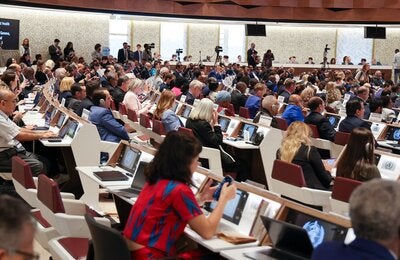
PAHO promotes cooperation to improve health workforce planning and management in the region.
Washington DC, September 20, 2023 (PAHO) - The Pan American Health Organization (PAHO) held a regional workshop on "Development of Human Resources for Health Information Systems (HRHIS) in the Americas," from September 11 to September 15, 2023, in Panama, with 90 participants and experts from 37 countries in the Americas, PAHO and the World Health Organization. The event aimed to address structural issues for HRHIS development and consolidation at the national level and their integration at the regional and global levels.
An HRHIS is critical for the effective management of human resources for health and to support the implementation of evidence and information-based policies. National health authorities with an HRHIS can anticipate various problems, such as an insufficient supply of health workers according to health systems' needs, compensate for the mobility of these resources due to retirement, death, or emigration, and efficiently plan their health workforce.
“Human resources for health information systems have limitations due to lack of data, which affects planning and evidence-based decision-making," said Benjamín Puertas, chief of the Human Resources for Health unit at PAHO.
“Human resources for health are essential for health systems, and being able to know who and how many they are, what they do, and how they are characterized, what ethnicity they belong to, and their gender, is extremely important because it gives us the tools to plan for the future," he added.
During the workshop, participants discussed occupations' mapping for the health sector, shared experiences, and strategies to improve the accuracy and completeness of occupation records to obtain a more complete and up-to-date view of their healthcare workforce. They discussed the importance of categorizing occupations consistently to improve human resources for health planning.
Furthermore, the participants validated a methodology for evaluating HRHIS maturity in their respective countries. Information was exchanged on the current stage of development of the systems, identifying challenges and opportunities to strengthen their effectiveness. The need to invest in technology and training to ensure systems meet the growing demands of the health sector was highlighted.
Another important activity during the workshop was identifying and mapping actors/stakeholders involved in developing of HRHIS in the countries, including educational institutions, regulatory bodies, professional associations, and other key partners. Collaboration between these actors is essential for effective human resources for health management.
Likewise, participants shared updated information on the National Health Workforce Accounts (NHWA) at the regional and global levels. The NHWA is a tool for countries to monitor their health workforce's size and composition and to support informed policy decisions and strategic planning.
"The workshop was a valuable forum to promote cooperation in the use of evidence and the exchange of knowledge among the region's countries to improve planning and management of human resources in health. Each topic discussed contributed to advancing the understanding and capacity for action of health systems in Latin America and the Caribbean," said Gisele Almeida, advisor, evidence and knowledge in human resources for health at PAHO.



